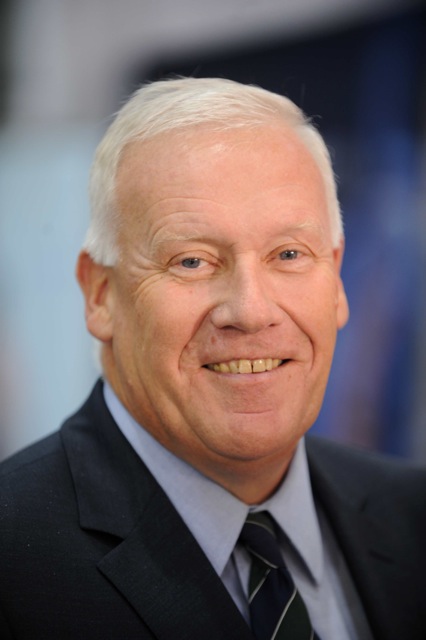"Piracy Hotspot is Shifting"
Vice-Admiral Hans-Joachim Stricker, ex-commander of the German fleet and President of the German Maritime Institute, thinks the industry in security matters is on a good path. But challenges remain.

Proper maritime safety tactics affect not only the safety on board, which is ensured with technical regulations, training of crews and life preservers. External threats of terrorism and piracy remains a key challenge in the shipping industry.
The security measures of the shipping companies bear fruit. "We have an international network that found good solutions and made oceans safe again," says Hans-Joachim Stricker, Vice Admiral, former commander of the  German fleet and President of the German Maritime Institute. Stricker is also Chairman of MS & D, an international conference on maritime security and defense, as part of SMM 2014. In an interview,Stricker talks about the challenges facing the industry, and the conference program.
German fleet and President of the German Maritime Institute. Stricker is also Chairman of MS & D, an international conference on maritime security and defense, as part of SMM 2014. In an interview,Stricker talks about the challenges facing the industry, and the conference program.
SMM takes place from September 9-12, 2014 - held at the Hamburg Fair site.
---
How safe international shipping is today?
Stricker: "This must be answered differentiated. Piracy off the Horn off Africa, which has provided us a long time with great challenges, we got in the last two years a better grip. Here more and more pirate attacks on merchant ships could be successfully defended. One reason is certainly the military protection under the EU-led Operation Atalanta. Prior to West Africa but there is a new hotspot. In the Gulf of Guinea militia-like organized pirates to blackmail especially ransom to finance their fight on land can. The danger, therefore, not banned, only the hotspot is shifting. "
What are the latest developments in the threat scenarios or which hot spots you identify?
Stricker: "We are finding that conflicts on the mainland can also mean a threat to the sea lanes. Take about the Middle East: There, an AIDA ship has recently come under fire. Such scenarios are indeed fortunately the exception, but must be taken very seriously. Operators of passenger or cruise ships should think twice about whether you approach conflict areas. "
What new security measures, there are anti-piracy, terrorism and acts of war?
Stricker: "We basically distinguish between active and passive safety measures. The active measures include in particular that we, for example, with European naval forces shade the headquarters of the pirates on the spot. So you can respond immediately to any action.Moreover, it is especially the high and clearly visible presence of security services on board the ships, the pirates be preventing the attack. Meanwhile, in Germany there are six certified security services that ensure this protection. The passive measures, we include, for example, the fitting of vessels with sound cannons. Several cruise lines work with this quenching method. Even driving in a zig-zag course and increased speed is a passive method of defense. Because at a speed of over 20 knots, a boarding by pirates is hardly possible. Some ships are also working with barbed wire, they condescend on the sides. In addition, it is important, of course, the constant exchange of data to get a fully comprehensive picture of the situation of a region. To ensure that we work together with the commanders of all participating institutions. "
What issues are at the MS & D conference in focus?
Stricker: "The conference will be set up thematically wide. To welcome keynote speaker is Sarah Kenny, Managing Director, QinetiQ Maritime, give a lecture on the topic "The future development of maritime security and defense". Then there will be two panels. The first is under the theme "Maritime challenges of globalization". Two speakers will be the subjects' safety in the port area "and" safety at sea "treat. A representative of SAMI, Security Association for the Maritime Industry will reveal the challenges from the perspective of industry. The second panel is entitled "Future maritime capabilities". Here it is all about trends in the field of naval vessels. Seminar participants will learn, for example, which ship designs and arrangements are particularly in demand in the future. Because the cost-effective multiple-use of ships is a key issue in the industry. At the end of the conference there will be a panel discussion and a summary of all important results. The key messages of the day will be provided to all participants as a so-called "take aways" available in writing. "
What is the situation with the participation of naval delegations?
Stricker: "We expect this year a number of high-profile delegations from around the world.The number of participants will level off at about the level of the event in 2012. This underlines once more the importance of the SMM. "
How important is the SMM is generally for the issue of security of international shipping?
Stricker: "The SMM as the world's leading maritime industry is a driving force. The merger of the Mass with the MS & D 2012 has many synergies revealed and proved a great success.Our participants were able to get the important information at the conference, and then examine the necessary hardware in the exhibition halls and business contacts. The focus of our conference participants is then certainly on Hall B8, where numerous shipyards, suppliers and service providers present from the maritime security sector, specializing in naval vessels. There is no better event in order to learn about the challenges of maritime security and take appropriate action. "
